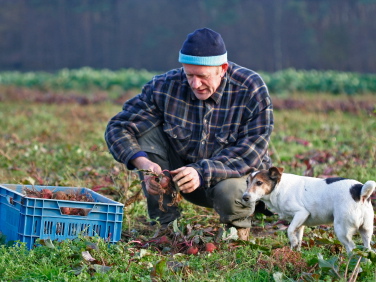
feature-image, l
(article, Carrie Floyd & Kim Carlson)
[%adInjectionSettings noInject=true] Here in Portland last week, the spotlight shone on three people who are helping us rethink the food we eat. On Tuesday, Carlo Petrini, the president and founder of Slow Food International, brought his message to a hungry and packed audience at the Arlene Schnitzer Concert Hall. Refreshingly, a health-care organization, Kaiser Permanente, hosted Petrini, who has just released a new book called Slow Food Nation; Corby Kummer ably served as Petrini's translator. Four of us Culinators were in the audience. Carrie Floyd, our food editor, had this to say afterward: p(blue).I cannot tell a lie: It was the underwear that got me. p(blue).All evening I found myself nodding in agreement with Carlo Petrini. "Hear! Hear!" I thought when he said that good food is not a privilege, but a right. When he spoke of the importance of linking economy and ecology, as opposed to separating them into two different schools, I leaned forward in my chair. I smiled when he mentioned Wendell Berry, someone else I admire. p(blue).And I followed with great interest his argument, starting with the Descartes quote "I think, therefore I am," that the alienation of man from his environment/agriculture was aided by industrialized farming. p(blue).When he got to the analogy of underwear, it took all my restraint to suppress my bravos and hallelujahs. p(blue).Here is the anecdote, in my best paraphrase: Never before in Italy, the rest of Europe, or the United States have we spent so little percent of our income on food. Mr. Petrini said, "I put this food in my body and it becomes me, Carlo Petrini." He then drew a line around his waist, mentioned Armani, and asked why it is that consumers will spend more money on the things they put on their bodies than the things they put into their bodies. Underwear over inner-wear — it's a compelling image. p(blue).This illustration was linked in Petrini's argument to the importance of getting rid of the concept of consumers. When we think of people as consumers — instead of farmers, friends, eaters — it only fuels a market that has its sights set on sales, not the health and well-being of individual people. And isn’t well-being the real bottom line? h4. Plenty more With the release of their new book, Plenty: One Man, One Woman, and a Raucous Year of Eating Locally, Alisa Smith and James MacKinnon are earning kudos for taking to the extreme something many of us are trying to do just a little better: Eat locally. The two, who hail from Vancouver, B.C., were at Powell’s on Wednesday night to give a talk about their book, which describes the year they spent eating food that came from within a 100-mile radius of their home. [%image "feature-image" float=right size=medium caption="James MacKinnon and Alisa Smith depended on local farmers for all of their food for a year, and they didn't even have to eat just root vegetables — like this farmer is sorting."] Imagining the turnip sandwiches MacKinnon concocted was fun, but I took home some other bites as well: MacKinnon and Smith said they felt healthier eating locally than they had before the experiment. Not only did food taste better, but they have a theory that it was more nutritious as well, because it was picked at the height of its nutritional peak. Further, MacKinnon and Smith actually found that they ate less when they were eating a strictly local diet — because they felt sated sooner. They discovered that honey was a fine substitute for sugar; in fact, after the one-year mark, when they tasted sugar again it tasted harsh. They allowed themselves a social-engagement caveat, but often their friends got into the spirit of the experiment and cooked locally for the couple. * Finally, they put food up, in the old-fashioned sense: They froze and canned it. Winter, then, became a time of plenty. Eating only local food that's been farmed using sustainable practices requires planning, but the rewards are great. As Carlo Petrini said, we have to find the equilibrium between taste and knowledge. It’s time for everyone to imagine the possibilities for eating better, not just for ourselves, but also for the world at large. h4. A must-read discussion about food and money Our friend (and future contributor) Bonnie Powell at the blog The Ethicurean recently opened her fridge to the world, as many bloggers (including Matt, Melissa, and David) have done at the behest of Sam at Becks and Posh. Bonnie's comments about her fridge, and especially about her reluctance to join the Pennywise Challenge in part because she believes we as Americans spend too little a portion of our income on food, have contributed to a lively and thoughtful discussion about food and class.

feature-image, l

reference-image, l